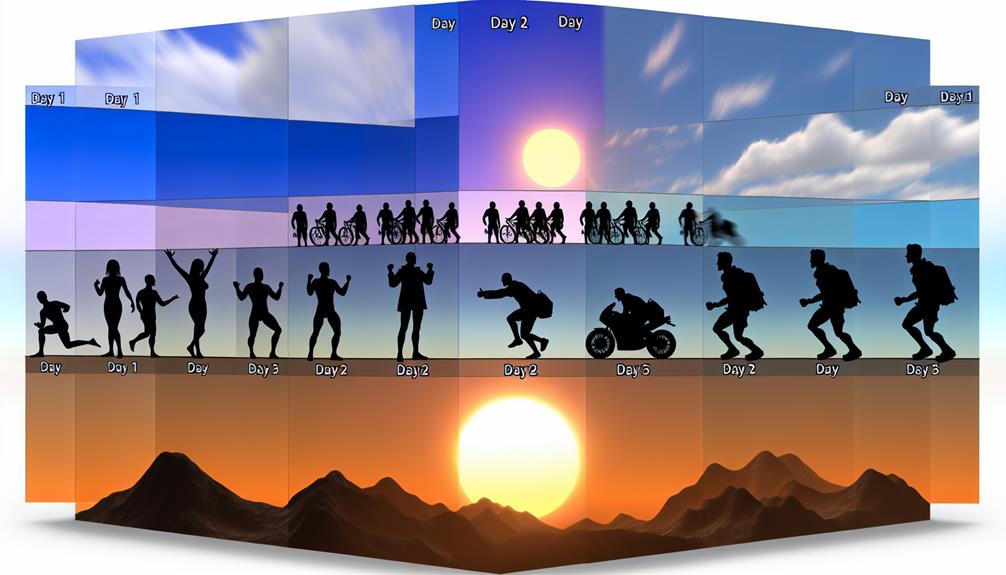Men's hormonal cycles, particularly those involving testosterone, greatly impact overall health. I've observed that daily fluctuations in testosterone levels peak in the morning and decline throughout the day, affecting energy and mood. Weekly patterns can influence physical performance, suggesting ideal times for intense workouts. Additionally, seasonal changes in testosterone levels can correlate with mood swings and fatigue during lower levels. Lifestyle factors—including sleep quality, diet, and stress management—further influence hormonal balance. Understanding these dynamics is essential for enhancing health outcomes and improving performance. If you stay with me, we can explore effective strategies for hormonal management.
Understanding Hormonal Cycles

Understanding hormonal cycles is vital for grasping how our bodies function, and it's often overlooked in discussions about male health. The endocrine system plays a significant role in this context, as it orchestrates the complex web of hormonal signaling that influences various physiological processes. Unlike the more commonly discussed fluctuations in female hormonal cycles, men experience a more subtle yet equally significant hormonal rhythm.
In men, testosterone is the primary hormone of interest, and its production is regulated by a feedback loop involving the hypothalamus, pituitary gland, and testes. This system guarantees that testosterone levels remain within an ideal range, influencing not just physical attributes, but also mood, energy levels, and cognitive function. Hormonal signaling is key here; when testosterone levels dip, the hypothalamus detects this change and signals the pituitary gland to produce luteinizing hormone (LH), which in turn stimulates the testes to increase testosterone production.
However, it's important to recognize that this signaling isn't static. Various factors—such as stress, diet, and sleep—can disrupt the delicate balance of the endocrine system, leading to altered hormonal cycles. As I explore deeper into the implications of these cycles, I can't help but emphasize the importance of understanding how they impact overall health. By acknowledging the intricate nature of hormonal cycles, we can better appreciate their influence on everything from physical performance to mental well-being, ultimately leading to more informed health choices.
Daily Testosterone Fluctuations
Daily testosterone fluctuations are a fascinating aspect of male hormonal cycles that can greatly impact various facets of life. As I explore this topic, it's essential to understand that these fluctuations are primarily governed by the body's circadian rhythm. This internal clock influences not just sleep-wake cycles but also the secretion of hormones, including testosterone.
Research indicates that testosterone levels typically peak in the early morning, with testosterone spikes occurring shortly after waking. This peak can be attributed to the body's natural rhythms, promoting energy and alertness at the start of the day. As the day progresses, testosterone levels gradually decline, reaching their lowest point in the evening. This diurnal pattern is not just a curiosity; it plays an important role in mood, energy levels, and even libido.
I've noticed that these daily fluctuations can lead to variations in physical performance, cognitive function, and emotional stability. For example, I often feel more energetic and focused in the morning, which aligns with the higher testosterone levels. Conversely, as the day winds down, I can experience a drop in motivation and energy, which may be linked to the declining hormone levels.
Understanding these cycles can empower us to better manage our daily activities and optimize performance. By aligning our tasks with our body's natural hormonal patterns, we can enhance productivity and well-being. Therefore, recognizing the significance of daily testosterone fluctuations is vital for anyone looking to improve their health and performance.
Weekly Hormonal Patterns

Throughout the week, men experience distinct hormonal patterns that can considerably influence their physical and mental states. These weekly patterns are primarily driven by testosterone, cortisol, and other hormones, each demonstrating specific variations throughout the week. For instance, I've observed that testosterone levels often peak on certain days, typically aligning with higher levels of physical performance and motivation. Conversely, these levels tend to dip on other days, which can lead to a noticeable decrease in energy and mood.
Cortisol, the stress hormone, also follows a weekly rhythm. It generally peaks in the early morning, providing that initial boost to tackle the day ahead, and gradually declines throughout the day. However, I've noticed that its levels can fluctuate based on stressors encountered during the week, contributing to overall hormonal variations. These fluctuations can impact not just energy but also cognitive function and emotional stability.
Moreover, understanding these hormonal variations offers valuable insights into optimizing daily routines and activities. For example, scheduling intense workouts or critical decision-making tasks during peak testosterone days can enhance performance and outcomes. By recognizing how my body responds to these hormonal patterns, I can make more informed choices about rest, exercise, and nutrition throughout the week.
Seasonal Changes in Hormones
How do the changing seasons impact men's hormonal levels? It's fascinating to observe how our environment can influence hormonal variations, particularly testosterone. Research indicates that men often experience seasonal fluctuations in testosterone levels, commonly referred to as seasonal testosterone.
During the spring and summer months, testosterone levels tend to peak. This may be attributed to increased sunlight exposure, which boosts vitamin D synthesis—a crucial factor in testosterone production. The longer days and warmer temperatures can also lead to heightened physical activity, further stimulating hormone production. Conversely, as autumn sets in and winter approaches, testosterone levels typically decline. This seasonal dip may be linked to reduced daylight and physical activity, which can lead to lower overall health and wellness.
Moreover, these hormone variations can have broader implications on men's health. Studies have shown that lower testosterone levels during the colder months may correlate with increased risks for certain health issues, including metabolic syndrome and decreased muscle mass. Understanding these seasonal changes can provide insight into how lifestyle adjustments, such as optimizing sunlight exposure and maintaining physical activity, can help mitigate the negative effects of low testosterone levels in winter.
Impact on Mood and Energy

It's intriguing to contemplate how fluctuations in testosterone levels can considerably impact mood and energy in men. As I've explored this topic, I've noticed how hormonal triggers can lead to significant mood swings. When testosterone levels drop, I often feel a decline in my energy levels, which can contribute to fatigue patterns that affect my daily activities. This relationship between hormones and mood is particularly evident during periods of stress, where the body's stress response can further exacerbate feelings of fatigue and emotional instability.
Moreover, I've observed that testosterone fluctuations can influence mental clarity and cognitive function. On days when my testosterone is at a higher level, I tend to experience sharper focus and increased motivation. Conversely, lower levels can lead to motivation fluctuations that leave me feeling unproductive and mentally foggy.
Sleep quality also plays an essential role in this dynamic. Poor sleep can diminish testosterone production, creating a vicious cycle that affects not only my energy levels but also my overall emotional resilience. It's fascinating how interconnected these factors are; when I prioritize good sleep hygiene, I often notice an improvement in my mood and energy.
Effects on Physical Performance
Testosterone levels play an essential role in my physical performance, influencing everything from strength to endurance. In strength training, elevated testosterone enhances muscle growth and recovery times, allowing me to push harder during workouts. This hormone directly correlates with my ability to build lean muscle, which is critical for improving my body composition and overall athletic performance.
When it comes to endurance sports, testosterone's impact is equally significant. It aids in optimizing my metabolic rate, providing the necessary energy for prolonged physical activity. The hormone also contributes to cardiovascular fitness, helping me maintain stamina over longer distances. For those of us who engage in various forms of exercise, understanding these hormonal fluctuations can help tailor training regimens for peak performance.
Moreover, testosterone plays a role in injury prevention. Higher levels facilitate quicker recovery and better muscle repair, reducing the likelihood of setbacks due to overtraining or injury. This aspect becomes essential when I'm balancing strength training with flexibility training, as it guarantees my body remains resilient and capable of handling diverse physical demands.
Hormones and Mental Health

Hormonal fluctuations considerably influence mental health, affecting mood, cognition, and overall emotional well-being. Understanding this connection is essential for managing anxiety disorders and enhancing mental wellness. For instance, decreased testosterone levels can lead to mood stabilization issues, contributing to feelings of irritability and depression.
I often find it fascinating how hormones impact cognitive function and emotional resilience. Let's look at a simplified breakdown of these relationships:
| Hormone | Psychological Effects |
|---|---|
| Testosterone | Enhances mood, reduces anxiety, supports cognitive function |
| Cortisol | Elevated levels can lead to stress and anxiety disorders |
| Estrogen | Influences mood stabilization and emotional resilience |
As I explore these dynamics, I realize the significance of effective stress management techniques. Techniques like mindfulness and physical activity can mitigate the adverse psychological effects of hormonal fluctuations. Additionally, hormonal therapy may be a viable option for some, offering a pathway to reclaim emotional balance and improve mental wellness.
Reproductive Health Considerations
How do hormonal fluctuations affect reproductive health? As I explore this topic, it's important to recognize that variations in reproductive hormones can markedly influence sperm quality. Testosterone, along with other hormones such as luteinizing hormone (LH) and follicle-stimulating hormone (FSH), plays a fundamental role in spermatogenesis, the process of sperm production. When these hormones fluctuate, which can occur due to stress, lifestyle changes, or environmental factors, the quality of sperm can be impacted.
Research indicates that lowered testosterone levels are often associated with reduced sperm motility and concentration. This decline can be particularly concerning for men looking to conceive. In addition, hormonal imbalances can also lead to abnormalities in sperm morphology, which refers to the shape and structure of sperm. Poor morphology can hinder a sperm's ability to fertilize an egg, thereby affecting reproductive potential.
Moreover, other lifestyle factors intertwined with hormonal cycles, such as diet, exercise, and sleep, can additionally exacerbate these issues. It's essential for men to monitor their lifestyle choices, as they can either promote or disrupt the delicate balance of reproductive hormones. Regular check-ups can also help identify any underlying hormonal issues early on.
Hormonal Imbalances and Conditions

Imbalances in reproductive hormone levels can lead to a range of conditions that markedly impact men's health and fertility. When I reflect on this issue, it's essential to understand how these hormonal fluctuations can indicate underlying endocrine disorders. For instance, low testosterone levels, often identified through hormonal testing, can result in decreased libido, fatigue, and even depression. These symptoms not only affect personal well-being but can also influence relationship dynamics.
Furthermore, elevated estrogen levels in men, sometimes due to obesity or certain medications, can lead to gynecomastia or the abnormal development of breast tissue. This condition not only has physical implications but also psychological effects, often resulting in diminished self-esteem.
Another significant hormonal imbalance involves thyroid hormones, where both hyperthyroidism and hypothyroidism can disrupt metabolism, energy levels, and mood, exacerbating overall health issues. Hormonal testing becomes essential here, as it provides insight into these imbalances, allowing for targeted interventions.
In my experience, recognizing the symptoms and understanding the implications of these hormonal imbalances is critical. It's not just about addressing a single symptom; it's about comprehending the broader spectrum of health concerns associated with endocrine disorders. By actively monitoring hormonal levels and seeking appropriate testing, I can take proactive steps towards managing these conditions, ultimately aiming for improved health outcomes and enhanced quality of life.
Lifestyle Factors Influencing Hormones
Many factors in daily life can greatly affect hormone levels, influencing both physical and mental health. Sleep quality is paramount; inadequate rest can lead to disruptions in testosterone and cortisol levels, which in turn affect mood and energy. Stress management also plays a fundamental role. Chronic stress elevates cortisol, resulting in potential hormonal imbalances that can exacerbate anxiety and depression.
Environmental toxins are another concern; exposure to endocrine disruptors can alter hormonal functions, leading to long-term health issues. As we age, the effects of aging become more pronounced, influencing hormone production and regulation. Understanding how aging impacts our hormonal cycles is essential to mitigate its effects.
Relationship dynamics can't be overlooked either. Healthy social interactions can enhance emotional well-being, which may positively influence hormone levels. Conversely, toxic relationships can lead to increased stress and hormonal dysregulation.
Dietary choices and hydration levels are foundational elements in maintaining hormonal balance. While this discussion doesn't explore specifics, it's imperative to recognize that what we consume and how well we hydrate can greatly influence our hormonal health.
Substance use, including alcohol and recreational drugs, can have deleterious effects on hormone production. Additionally, achieving a proper work-life balance is essential. Overworking can lead to burnout, impacting sleep and stress levels and ultimately hormonal health.
Nutrition and Hormonal Health

Nutrition plays a vital role in maintaining hormonal health, influencing everything from testosterone levels to insulin sensitivity. I've often observed how a well-balanced diet can promote ideal hormonal function, while deficiencies can lead to imbalances that affect overall well-being. The relationship between macronutrients—proteins, fats, and carbohydrates—and hormone production is particularly significant. For instance, healthy fats are essential for synthesizing steroid hormones, including testosterone.
In my experience, the timing of nutrient intake, known as nutrient timing, can greatly enhance hormonal responses. Consuming carbohydrates and proteins post-workout can stimulate insulin release, aiding muscle recovery and promoting an anabolic state. This timing can also mitigate cortisol spikes, which, if left unchecked, might lead to a catabolic state detrimental to muscle mass.
Additionally, I've found that dietary supplements can play a supportive role in enhancing hormonal balance. For example, zinc and magnesium are vital for maintaining testosterone levels, while omega-3 fatty acids can improve insulin sensitivity and reduce inflammation. However, it's essential to approach supplementation with caution and consult with healthcare professionals to avoid potential adverse effects.
Exercise and Testosterone Levels
The intricate relationship between exercise and testosterone levels is a foundation of hormonal health. Through my exploration of this connection, I've found that the type and intensity of exercise can greatly affect testosterone production and regulation. For those seeking to enhance their hormonal balance, understanding the nuances of various workout routines is fundamental.
Engaging in strength training is particularly effective at boosting testosterone levels. However, there's a delicate balance to maintain. Here are some essential factors to bear in mind:
- Workout intensity: Higher intensity workouts can lead to greater testosterone spikes.
- Exercise timing: Performing strength training in the late afternoon or early evening may yield better hormonal responses.
- Recovery phases: Adequate rest is essential; overtraining can counteract testosterone boosts.
- Body composition: Maintaining a healthy body fat percentage supports ideal hormone levels.
- Endurance exercises: While beneficial for cardiovascular health, excessive endurance training may reduce testosterone levels.
When integrating these elements into my fitness routines, I also reflect on the role of hormonal supplements, like testosterone boosters, to support my goals. It's important to recognize that training adaptations vary among individuals, and what works for one person might not for another.
Strategies for Hormonal Management

Steering through the complex landscape of hormonal management requires a multifaceted approach that addresses both lifestyle choices and physiological responses. I've found that integrating specific supplement strategies can considerably enhance hormonal balance. For instance, supplements like zinc and vitamin D are known to support testosterone levels, while omega-3 fatty acids can help modulate inflammation, which is vital for overall hormonal health.
Additionally, stress management plays a pivotal role in hormonal regulation. Chronic stress elevates cortisol levels, which can negatively impact testosterone and other hormones. I've discovered that incorporating mindfulness practices, such as meditation or deep breathing exercises, can effectively lower stress and promote a more balanced hormonal profile. Regular physical activity also serves as a natural stress reliever and can enhance hormonal stability.
Moreover, maintaining a balanced diet rich in whole foods is essential. I prioritize nutrient-dense foods that provide the vitamins and minerals necessary for ideal hormone production. I aim for a balance of macronutrients, ensuring sufficient protein intake to support muscle mass and healthy fat consumption to aid hormone synthesis.
Frequently Asked Questions
How Do Hormonal Cycles Differ Between Younger and Older Men?
When considering how hormonal cycles differ between younger and older men, I've noticed significant testosterone fluctuations. Younger men typically experience more pronounced daily variations, while older men tend to show a gradual decline in testosterone levels due to age-related changes. This decline can lead to diminished energy, libido, and overall vigor. Understanding these differences can help us address the health implications associated with aging and hormonal balance effectively.
Can Medication Affect a Man's Hormonal Cycle?
It's a bit like a symphony; each instrument plays its part in harmony. Similarly, medication types can greatly influence hormonal fluctuations in men. For instance, steroids can amplify testosterone levels, while antidepressants might alter serotonin, affecting overall hormonal balance. I've noticed that certain medications can lead to unexpected changes in mood and energy, underscoring the delicate interplay between pharmaceuticals and hormonal cycles. It's essential to monitor these effects, as they can impact overall health.
Are There Natural Supplements to Balance Hormones?
I've found that natural supplements can indeed help balance hormones. Herbal remedies like ashwagandha and maca root are popular choices, often praised for their adaptogenic properties. Additionally, I've noticed that making dietary changes, such as increasing healthy fats and reducing processed sugars, can greatly impact hormone levels. It's essential to approach this holistically, combining both herbal remedies and mindful dietary adjustments for best results. Always consult a healthcare professional before starting any supplements.
How Do Stress Levels Impact Hormonal Health?
I've found that stress levels greatly impact hormonal health, particularly by affecting cortisol levels. High stress can lead to imbalances that harm emotional health. By incorporating stress management techniques like physical activity and relaxation techniques, I've noticed improvements in my overall well-being. Making lifestyle changes to prioritize mental resilience and stress reduction has been essential. It's fascinating how much our daily choices influence our hormonal balance and overall health.
What Role Does Sleep Play in Hormone Regulation?
Ever feel like a zombie after a bad night's sleep? I can relate. Sleep quality is essential for maintaining hormonal balance, as it directly influences our circadian rhythm. When I experience sleep deprivation, my body struggles to regulate hormones like cortisol and insulin, leading to imbalances that can affect mood and metabolism. Prioritizing good sleep not only enhances my overall health but also keeps my hormones in check, fostering a more stable body and mind.
